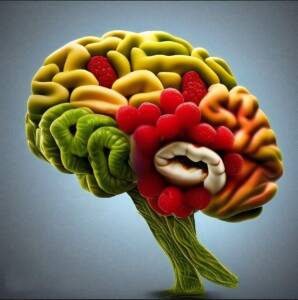Magnesium rich foods and mental health:
Magnesium is very important mineral for overall wellness. It plays important role for several bodily function. Magnesium-rich foods support mental health through various mechanisms and benefits, which include:
- Neurotransmitter regulation:
It plays a crucial role in the regulation of neurotransmitters like serotonin and dopamine. These neurotransmitters are essential for mood regulation and sense of well-being. Adequate levels can contribute to the proper functioning of these mood-related chemicals.
- Stress reduction:
It helps regulates the body’s stress response by modulating the release of stress hormones like cortisol. This can result in reduced feelings of anxiety and stress, promoting a calmer state of mind. If you know more about stress reduction techniques like meditation and mindfulness, then read this article, https://sparklinglifestyle.in/mindfulness/#
- Improved sleep:
It is known to promote better sleep quality. It helps relax muscles and nerves, making it easier to fall asleep and stay asleep. Quality sleep is essential for maintaining good mental health.
- Brain function;
It is involved in many cognitive functions, including learning and memory. It supports the transmission of electrical signals between brain cells, which is crucial for optimal brain function and mental clarity.

- Migraine prevention:
For those prone to migraines, it can be beneficial. Migraines are often associated with changes in blood vessel constriction and neurotransmitter activity. Magnesium’s ability to relax blood vessels and modulate neurotransmitters may help reduce the frequency of severity of migraines.
- Reduced symptoms of depression:
Some studies suggest a potential link between magnesium deficiency and symptoms of depression while magnesium alone is not a cure for depression, maintaining sufficient levels may contribute to overall mental well-being.
- Anxiety reduction:
It’s calming effect on the nervous system can help reduce symptoms of anxiety. It may reduce restlessness and promote a sense of relaxation.
- Energy production:
Mechanism is involved in the body’s energy production processes, having sufficient magnesium can help combat fatigue and maintain mental alertness.
- Inflammation reduction;
Running inflammation is linked to various mental health disorders. IT has anti-inflammatory properties that may help reduce the risk of inflammation related conditions affecting the brain.
Magnesium rich foods:
- Spinach:
In spinach: Approximately 157 milligrams per 100 grams. Moreover, other nutrients: Iron, vitamins A, K, and fiber. In addition, Benefits of mental health: Magnesium in spinach supports brain function and mood regulation.
- Almonds:
In almonds: About 270 mg per 100 gm. Moreover, other nutrients: High in vitamin E, healthy fats, and protein. In addition, benefits for mental health: Almonds provide energy and nutrients for cognitive function.
- Avocado:
In avocado: Around 29 mg per 100 gm. Additionally, Other nutrients: Rich in healthy fats, fiber, and potassium. Furthermore, benefits for mental health: Avocado’s healthy fats support brain health and mood stability.
- Black beans:
In black beans magnesium content: Approximately 70 milligrams per 100 grams.
In addition, other nutrients: High in fiber, protein, and folate.
Additionally, benefits for mental health: Black beans provide steady energy and improve mood regulation.
- Pumpkin seeds:
In Pumpkin seeds magnesium content: About 535 milligrams per 100 grams.
In addition, other nutrients: High in protein, healthy fats, and zinc.
Moreover, benefits for mental health: The magnesium and zinc in pumpkin seeds support brain function and produce stress.
- Dark chocolates: (In moderation)
In dark chocolate magnesium content: Around 327 milligrams per 100 grams.
In addition, other nutrients: Contains antioxidants and can improve mood.
Moreover, benefits for mental health: The moderation consumption of dark chocolate can boost mood and cognitive function.
- Quinoa:
In Quinoa Magnesium content: Approximately 197 milligrams per 100 grams.
Moreover, other nutrients: High in protein, fiber, and various vitamins.
In addition, benefits for mental health: Quinoa provides sustained energy and supports brain health.
- Cashews:
In cashews magnesium content: About 292 milligrams per 100 grams and In addition, other nutrients: rich in healthy fats, protein, and vitamin E.
Moreover, benefits for mental health: Cashews contribute to brain function and mood stability.
- Tofu:
In tofu magnesium content is approximately 37 milligrams per 100 grams, good source of protein, iron, and calcium and In addition, Tofu provides essential nutrients for overall well-being.
- Fatty fish: (such as salmon)
In fatty fish magnesium is about 29 milligrams per 100 grams and High in Omega-3 fatty acids, protein, and vitamin D.
Additionally benefits for mental health: fatty fish supports brain health, reduces inflammation, and improves mood.
Conclusion:
These foods offer a range of nutrients, including magnesium, that can positively impact mental health when incorporated into a balanced diet. It is important to note that while magnesium rich foods can support mental health, they are just one component of a holistic approach to mental well-being. A balanced diet, regular exercise, adequate sleep, stress management and seeking professional dietitian or nutritionist or a doctor’s help when needed are also essential for maintaining good mental health. If you are suspect a magnesium deficiency or have concerns about your mental health, it is advisable to consult a doctor for guidance and appropriate interventions. If you know more about mental health, then read my latest book, the magical ways for sparkling lifestyle.



Leave a Comment